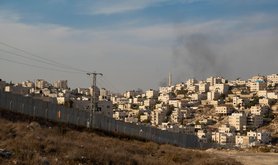
Only one way out: a unitary state with equal rights in Palestine-Israel
Everyone who values democracy, justice and human decency should assist the Palestinians in achieving this goal.

The Zionist project that established Israel in 1948 always had at its centre the aim of acquiring Palestine's land without its native population. In the 72 years of Israel's existence to date, that aim never wavered. It led to the mass Palestinian expulsions of 1947-9, the second mass expulsion in 1967, and an ongoing campaign of ethnic cleansing since then to denude the Palestinian presence in the country still further.
We may now be reaching the terminal stages of that process if Israel's proposed annexation of parts of the West Bank goes ahead. In that event the consequent loss of West Bank land will destroy any chance of a state the Palestinians had hoped for in the remnants of their original homeland. Instead, Trump's Middle East peace plan will offer them a series of disconnected islands amid an Israeli sea of Jewish settlements to be their state.
It is an existential moment in Palestinian history that confronts Palestinians with hard choices and little time. Annexation is supposed to commence this month, but may be delayed, as opinion is divided inside Israel on when and whether it should happen. The US, Israel's backer and architect of the 'deal of the century' that encouraged this annexation, has argued it should happen only in the context of peace negotiations towards a Palestinian state.
Either way, Palestinians are faced with a dilemma: do they persist with the quest for a two-state solution, blessed by the international community, affirmed in several UN resolutions, and in 2012 the UN General Assembly recognition of the State of Palestine by a majority of UN member states? Or should they abandon that futile quest and seek a different strategy?
All about Palestinian statehood
The Palestinian Authority (PA) seemed to be veering towards the second alternative when the Palestinian de facto president, Mahmoud Abbas, announced in May that in the event of annexation, past agreements between the PA and Israel would be abrogated, and security coordination, so valuable to Israel's security strategy, would cease. The West Bank would then revert to its pre-1993 status, when it was under direct Israeli military occupation without the PA's essential buffering effect. The PA, Abbas predicted, would likely collapse as a result of these moves and be disbanded, and the two-state solution would be at an end.
We’ve got a newsletter for everyone
Whatever you’re interested in, there’s a free openDemocracy newsletter for you.
The loss of West Bank land will destroy any chance of a state the Palestinians had hoped for in the remnants of their original homeland
But these bold steps might yet be another ploy to gain international support for a negotiated settlement towards creating a Palestinian state. That would not be surprising. Ever since the 1988 Palestine Liberation Organisation's Algiers Declaration of statehood on the post-1967 territories, Abbas has been part of a Palestinian movement whose raison d'être was the attainment of that aim. Supported by a substantial body of Palestinian opinion, the two-state solution articulated this aspiration for decades.
To see it now under terminal threat by Israel's annexation is alarming for its supporters. In Gaza and the West Bank they have reacted with calls for a resumption of the armed struggle; there is a fresh attempt at unity between the main Palestinian factions, Fatah and Hamas, to confront Israel. The political discourse is all about Palestinian statehood.
Getting real
Yet, decades of experience should have shown that none of these past strategies has been effective against Israel's steady advance on Palestinian land and rights. Only a new plan, one that takes account of the reality of the Palestinian position today, can work.
Not since the Nakba of 1948, have Palestinians been so weak. The Arab world, that was traditionally their support base, has changed. A hitherto unthinkable rapprochement between several Arab Gulf states and Israel has been growing in recent years, despite Israel's ongoing oppression of the Palestinians. Egypt's cruel blockade of Gaza, augmenting Israel's, is unremitting.
In addition, there are suggestions of a weariness with Palestine's cause amongst ordinary Arabs, perhaps not surprising for what seems an endless and insoluble conflict. By contrast, international popular support for the Palestinians has been growing, especially in Europe and America. The boycott, divestment and sanctions (BDS) campaign is a major part of that and may lead somewhere eventually. But it will take too long to rescue what remains of Palestine.
Israel, in comparison, is at the zenith of its power, wealthy, well-armed, and strongly backed by western states. It enjoys an exceptional international status that absolves it of accountability for whatever violations of law it commits, including the proposed annexation. The power imbalance between Israel and the Palestinians could hardly be starker, and makes a mockery of any peace plan not on Israel's terms ever succeeding.
If all Palestinians become citizens, Israel's demography would irrevocably alter towards pluralism
That is the real context in which a Palestinian strategy for the post-annexation future has to be devised. Its thrust must be to reverse Israel's attempt to annihilate the Palestinians as a people, and to restore their rights. That will mean keeping them on their land and enabling them to lead normal lives.
Equal rights
It is a tall order, and only one route can lead to its attainment: a new regime of equal civil and political rights for all who live under Israel's rule - Israeli citizens and stateless Palestinians - replacing Israel's current apartheid state structures. This is no far-fetched fantasy when one examines the facts.
Israel today is de facto one state from the Jordan River to the Mediterranean Sea. It has a population of 6.6 million Israeli Jews with citizenship and full rights, 1.8 million Israeli Palestinians with citizenship and partial rights, and 4.7 million Palestinians with no citizenship and no rights.
For 53 years Israel has managed to maintain this inequitable arrangement, evading international conventions and violating human rights norms. The world has looked on impotently as Israel's illegal occupation continued and its apartheid system was blatantly applied to non-Jews under its rule, without anyone apparently able to stop it.
That is, except the Palestinians. They are uniquely placed to disrupt this situation for good. Their call for equal rights will get to the heart of Zionism, an ideology predicated on Jewish majority rule and Jewish exclusivity. If all Palestinians become citizens, Israel's demography would irrevocably alter towards pluralism, and so bring Zionism to an end. Israel and its supporters know that better than anyone, and will fight ferociously to destroy such a possibility. But it does not alter the validity of the equal rights principle.
Frontline for democracy
It will take a long, hard campaign and many supporters to make it happen, and everyone who values democracy, justice and human decency should assist the Palestinians in that struggle. In the end, for Palestinians, and Jews who live and feel with them, there is no other way.
Read more
Get our weekly email




Comments
We encourage anyone to comment, please consult the oD commenting guidelines if you have any questions.